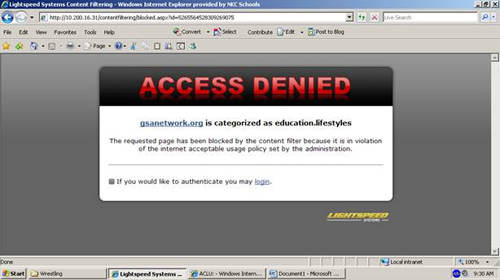
Today is Banned Websites Awareness Day – a designated day within Banned Books Week – which is sponsored by our friends at the American Association of School Librarians and designed to raise awareness of the overly restrictive blocking of legitimate, educational websites and academically useful social networking tools in schools and school libraries. At the ACLU LGBT Project, this is a subject near and dear to our hearts, and today we’re releasing a new report about our work to fight back against banned websites.
The report is part of the ACLU’s “Don’t Filter Me” campaign, which started over a year and a half ago to take on viewpoint-discriminatory censorship of positive LGBT web content in public schools nationwide. While most public schools use web filtering software to block students’ access to pornographic websites, in accordance with federal law, we found that many of the most commonly used school web filtering software packages were also blocking websites that contain information about LGBT issues and organizations – sites that aren’t sexually explicit in any way. At the same time, most of those software packages did allow access to anti-gay websites. This viewpoint discrimination violates students’ rights under the First Amendment.
When we put out the call for students across the U.S. to let us know if their schools’ web filters discriminated on the basis of viewpoint in this way, we heard from students from all over. For example, Justin Rodriguez, a student from Vineland, New Jersey, was trying to do research on Harvey Milk, one of the nation's first openly gay elected officials, but found that sites about Milk were blocked. “Seeing all these websites that are considered somehow unacceptable because of something I am was really offensive to me,” Justin told us. Another student, Melina Zancanella, the president of the gay-straight alliance club at a high school in Oroville, California, told us, "I tried to look up ways our gay-straight alliance club could help stop teen suicide, but the websites were blocked. It's really unfair that our school is blocking this information from us."
Today, Banned Websites Awareness Day, seems like the perfect time to us to issue our final report on the results of the “Don’t Filter Me” campaign. The report details how we first got dozens of individual schools to end their discriminatory web filtering practices, went on to successfully sue a school district in Missouri that refused to change its filtering software even after we explained to them how it violated students’ rights, and ultimately got most of the filtering software companies used in thousands of school districts across the U.S. to stop discriminating against pro-LGBT points of view. So check out our report for more details!
The ACLU believes that the suppression of words, images, or ideas that some people think are "offensive," – whether they happen to appear in books or on websites – is a violation of our First Amendment rights. We believe in an educated citizenry and a society where ideas are openly disseminated, discussed, and debated. And you can be sure that we’ll continue to protect the right to access information (and the right to make up your own mind) for many years to come.
Learn more about web filtering: Sign up for breaking news alerts, follow us on Twitter, and like us on Facebook.



